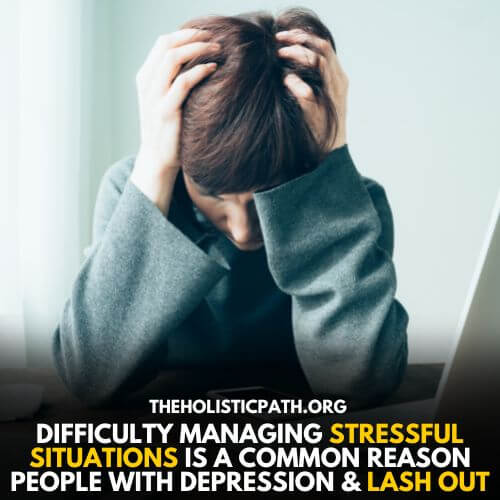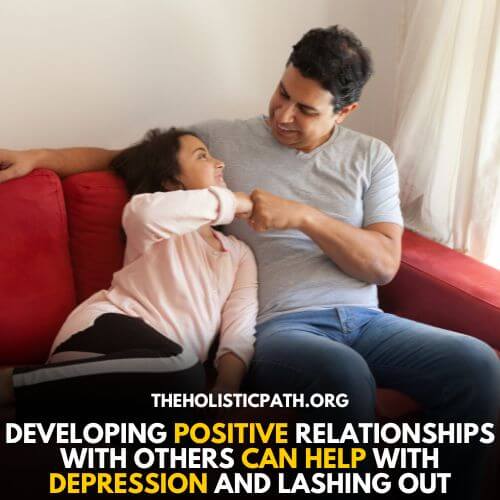Are you, or is someone close to you, struggling with expressing their feelings in healthy ways? Unfortunately, lashing out is a common symptom that is often associated with depression.
It is essential to be aware of the signs and understand why they are happening. In this article, we’ll explore how depression can lead to behaviors like lashing out and provide insight into how to address the situation. Tune in to learn more about is lashing out a sign of depression!
Why Do People Lash Out?
People can lash out for a variety of reasons. It could be from an accumulation of stress, fear, anger, frustration, or even guilt that the individual is feeling. The lashing-out behavior is often a result of having no other way to cope with the situation or feelings and it serves as an attempt to gain control over the emotions internally and externally.
It can also be seen as a form of communication when individuals do not know how to properly express themselves using more appropriate methods. This is generally due to either not knowing how to express their feelings in constructive ways or not having the necessary language skills to do so. In these cases, aggression becomes one of the only ways they feel they can communicate what they are feeling inside.
Sometimes people lash out because they have been hurt in some way in the past or are feeling threatened or vulnerable in some way in their current environment. When this happens, it is often an attempt to control others by getting them to back off or stop doing something that makes them uncomfortable or scared.
At times, people may lash out due to mental health issues such as depression and anxiety which can lead to difficulty regulating emotions and feelings (especially negative ones). This difficulty may lead them to become overwhelmed with their emotions resulting in lashing out at others when things become too much for them emotionally.
Ultimately, lashing out is a sign that something deeper is going on internally for an individual, and addressing the root cause can help get rid of these destructive behaviors.
Is Lashing Out A Sign Of Depression?
Yes, lashing out can be a sign of depression. It’s important to remember that not everyone with depression is the same and will display different signs and symptoms, as well as have unique experiences. With that in mind, here are some valid points to consider when looking at whether or not lashing out is a sign of depression:
- Lashing out can be a result of extreme frustration. People who suffer from depression often experience low self-esteem and negative thoughts that lead to feelings of hopelessness and frustration. When these negative thoughts become too much, people may express their frustrations by lashing out either verbally or even physically.
- People with depression may lash out as a form of self-sabotage or punishment. They may feel guilty or undeserving of any positive emotions they’re experiencing, so they might try to punish themselves by lashing out in order to avoid feeling better temporarily.
- Lastly, people who are suffering from depression may lash out because they feel overwhelmed by their emotions and lack the ability to manage them in an appropriate way. This makes sense since feeling overwhelmed by intense emotion can lead to aggressive behavior such as lashing out.
3 Signs of Lashing Out That May Indicate Undiagnosed Depression
If you or someone you know is displaying some of the following behaviors, it may be a sign that there is an underlying depression problem:
- Abrupt or Unexplained Mood Changes: People who are struggling with undiagnosed depression may experience sudden and unexpected changes in their moods. These might include extreme emotional swings from one end of the spectrum to the other, for no apparent reason. This could mean that a person is feeling very happy one moment, then suddenly sad and depressed the next.
- Unexpected outbursts or Aggressive Behaviors: Depressed individuals often act out their feelings through aggression. They may have sudden outbursts of anger, rage, and/or violence that they wouldn’t normally display without being prompted by an external factor, such as a stressful situation or difficult conversation.
- Increased Irritability, Anxiety, and Frustration: People who are suffering from depression often appear frustrated and anxious more frequently than when they were healthy. This can manifest itself in increased irritability or edginess when dealing with situations or people that they would typically be able to handle with ease in the past. Additionally, they may be unable to complete tasks as easily due to their lack of motivation and focus associated with depression which can lead to further anxiety and frustration.
4 Ways Depression Can Affect Behavior
Depression can have a profound effect on our behavior. It can change the way we think, act, and interact with others. Depression can make us feel isolated, helpless, and hopeless.

Here are some of the common ways depression can affect behavior. All of these effects can manifest in different ways including lashing out at others which is often an attempt to gain control over internal emotions.
- People with depression can have an increase in aggressive behaviors which can be directed toward other people or objects. This may manifest in outbursts of anger, shouting, or physical aggression. Such behavior is often caused by feelings of being overwhelmed and helpless, as well as general dissatisfaction with life. Additionally, people who experience depression may feel misunderstood or ignored and lash out at those around them as a way to cope with their emotions.
- Difficulty focusing or concentrating is another common symptom of depression. People can find it hard to stay on task and may become easily distracted or have difficulty following instructions. This lack of focus can make completing daily tasks more difficult, leading to further feelings of frustration or worthlessness. Depression can also lead to changes in sleep patterns which may further impair concentration and focus due to fatigue.
- Poor Decision-Making: Depression can lead to a decrease in logical thinking and problem-solving abilities, resulting in poor decision-making. This is often due to the lack of motivation and negative thought patterns associated with depression, which can cloud judgment and prevent effective evaluation of a situation. Additionally, people may make impulsive decisions that they later regret while they are under the influence of depression.
- Increase in Irritability and Impatience: Individuals with depression may become more easily frustrated and have a shorter fuse than usual. They might also experience an intolerance for noise or other stimuli that would typically be considered benign. This irritability is often caused by an inability to manage emotional responses to stressful situations, as well as underlying feelings of sadness and hopelessness that accompany depression.
Anger And Irritability
When someone is dealing with depression, one of the symptoms they may experience is anger and irritability. This can manifest in a variety of ways, from passive aggression to outbursts.
It can be extremely distressing for both the person dealing with depression and those around them. Here are some ways that anger and irritability from depression can cause someone to lash out:
- Intense feelings of frustration or helplessness can lead to lashing out at those around them as a way to cope with their emotions.
- When negative thoughts become overwhelming, they may erupt into angry outbursts that could have been avoided if they had been able to process their emotions more effectively.
- People who are feeling depressed often struggle to express their feelings in a healthy way, so when faced with frustrating situations, they may lash out instead of looking for constructive solutions.
- Depression can also cause people to believe that others are actively trying to hurt them, which can lead to angry reactions toward people who are only trying to help.
- When someone is feeling down and frustrated about their own situation, it’s easy for them to get caught up in projections of how other people should act or how events should turn out – and this can manifest as lashing out when things don’t go as planned.
Other Reasons For People With Depression To Lash Out
There are a variety of reasons why people with depression may lash out. Here are just some of the common ones:
1. Feelings of Hopelessness and Helplessness
People with depression often lash out as a way to express their sense of hopelessness and helplessness. This is because depression causes an individual to feel like they have no control over their lives and that there is nothing they can do to make things better.
It can be difficult for them to manage the overwhelming emotions, thoughts, and physical sensations associated with depression. So, they may act out in frustration or impulsively lash out at others as a way to cope with these feelings of powerlessness.
2. Difficulty Managing Stressful Situations
Difficulty managing stressful situations is another common reason people with depression lash out. When faced with high levels of stress, people with depression may find it hard to keep their emotions in check or respond appropriately. This can lead them to lash out either verbally or physically, which can be extremely damaging for those around them and also cause further distress in the person experiencing the depressive episode.

Identifying potential triggers and assessing how best to manage them before they reach an uncontrollable level can help reduce the likelihood of lashing out when faced with stress.
3. Low Self-Esteem or Lack of Confidence
Depression can be incredibly damaging to a person’s self-esteem, especially when it comes to their self-image and the way they view themselves. As depression takes hold, it can become harder for people to experience joy or satisfaction in their accomplishments. This creates a vicious cycle in which the individual experiences even lower levels of confidence and esteem, leading them to lash out at others or avoid social interactions altogether.
4. Withdrawal from Social Interactions
As someone experiences depression, they may start withdrawing from social situations in order to protect themselves from further emotional pain. It is not uncommon for people with depression to feel overwhelmed by emotions such as anger, sadness, and guilt when confronted with social situations, leading them to lash out at those around them as a defense mechanism.
The feelings of isolation associated with depression can also contribute to this lashing-out behavior as the individual may feel like they have no one else to turn to.
5. Difficulty Identifying and Expressing Emotions Properly
People with depression may lash out due to difficulty identifying and expressing emotions properly. This can be due to a lack of understanding or insight into their own feelings, or because they feel ashamed or scared of opening up about their emotions. Feeling isolated, misunderstood, and unable to talk about what they’re going through can lead them to become frustrated and act out.
6. A Desire to Act Out in Response to Negative Experiences
Another reason why someone with depression might lash out is a desire to act out in response to negative experiences. When people are feeling overwhelmed by difficult situations in their lives, they might take it out on others in an attempt to cope with the stress and pressure they’re facing. This could be through lashing out verbally, physically, or through passive-aggressive behavior.
7. Inability to Overcome Traumatic Events
Finally, a person with depression who lashes out might be struggling with an inability to overcome traumatic events that have happened in their life. Trauma can leave people feeling powerless and vulnerable, resulting in feelings of anger and frustration that they may not know how to manage constructively. As a result, they may express these emotions by reacting aggressively towards other people or objects as a way of venting their inner turmoil, even if it doesn’t always make sense logically.
Strategies To Help People Who Lash Out From Depression
When someone is dealing with depression and lashing out, it can be difficult to know how best to address the situation. It is important to remember that lashing out is often a symptom of deeper underlying issues and should be handled carefully.
Understanding the causes of this behavior can help us create strategies to better support individuals struggling with depression-related lashing out. Here are some strategies that can help in these situations:
1. Seek Professional Help
Seeking professional help is the most important step in helping someone who is lashing out from depression. Professional help can come in many forms, including therapy and medication. A therapist can offer guidance and understanding, as well as give techniques for managing difficult emotions.
Medication can also be prescribed to help with managing symptoms of depression. It’s important to remember that these are long-term treatments and require commitment from both the person seeking help and their support system to get the best results.
2. Learn Healthy Coping Strategies
Learning healthy coping strategies is an important step in helping people who lash out from depression. These strategies involve developing and using tools to cope with difficult emotions and situations in a productive way. This could include deep breathing exercises, guided relaxation, mindfulness activities, or journaling.
It can also include seeking professional help or support from a therapist or support group. All of these strategies can help someone regulate their emotions and become better equipped to manage their feelings in the long run. With practice, these strategies can help individuals work through any negative feelings they have without resorting to lashing out.
3. Practice Self-Compassion and Acceptance
Practicing self-compassion and acceptance is one of the most important strategies to help people who lash out from depression. It involves being kind to yourself, recognizing your mistakes, understanding that everyone makes them, and taking responsibility for how you feel. When we practice self-compassion, we can give ourselves the same compassion that we would give to a friend.
We can learn to forgive ourselves and allow our imperfections without judgment. Practicing self-compassion also helps us realize that our struggles don’t define us; they are just part of life’s journey.
It teaches us to move forward and not be so hard on ourselves when things go wrong. Lastly, practicing self-compassion enables us to build a kinder relationship with ourselves and others, which can be really beneficial in improving mental health symptoms related to depression.
4. Implement Stress Management Techniques
A vital part of helping people who lash out from depression is to help them learn and practice stress management techniques. This could include activities such as deep breathing, meditation, physical exercise, guided imagery, journaling, and progressive muscle relaxation.
These strategies can help individuals regulate their emotions and manage the intensity of their feelings. They can also provide a sense of control in situations that may otherwise feel overwhelming or out of control. Additionally, these activities are a natural way to reduce stress levels and help individuals better manage their mental health.

5. Develop Positive Relationships with Others
Developing positive relationships with others is an important strategy for people who are lashing out from depression. Having a strong support system of family and friends can help provide emotional and physical comfort during times of distress. It can also be beneficial to engage in activities with others, such as exercise or hobbies, in order to build relationships and increase feelings of connectedness.
This type of socialization can lead to improved mental health outcomes and provide an outlet for the individual to express their emotions in a safe space. Additionally, developing relationships with mental health professionals or joining support groups can help individuals build interpersonal skills while obtaining valuable resources and guidance.
Ultimately, having positive relationships provides an individual with a sense of purpose, hope, acceptance, and belonging which are all necessary components for recovery from depression.
6. Engage in Relaxation Practices such as Yoga or Meditation
Engaging in relaxation practices such as yoga or meditation can be an effective strategy for helping people who lash out from depression. Yoga and meditation are great tools for relieving stress, calming the mind and body, and finding inner peace. Through this practice, people can learn to recognize their own emotions, become aware of when they’re feeling overwhelmed, and then take steps to manage them more effectively.
Additionally, yoga and meditation have been linked to improved mood regulation, which can decrease the severity of depressive episodes. Through regular practice of these relaxation techniques, individuals may find themselves more equipped to handle stressful situations without lashing out in a negative manner.
Conclusion
Although lashing out is not the only symptom of depression, it can be dangerous if left unchecked. It’s important to take any signs of depression seriously and get help from a professional if you think that you or someone you know needs assistance.
Dealing with depression can feel overwhelming but having resources and support can help to make the process more manageable. With patience, determination, and the right people by your side, it is possible to overcome depression and mental health issues – taking one step at a time.
References
Sahu, A., Gupta, P., & Chatterjee, B. (2014). Depression is More Than Just Sadness: A Case of Excessive Anger and Its Management in Depression. Indian Journal of Psychological Medicine, 36(1), 77–79. https://doi.org/10.4103/0253-7176.127259
Greenfieldboyce, Nell. “If You’re Often Angry or Irritable, You May Be Depressed.” NPR.org, 4 Feb. 2019, www.npr.org/sections/health-shots/2019/02/04/689747637/if-youre-often-angry-or-irritable-you-may-be-depressed.
